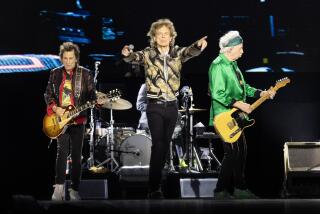POP MUSIC REVIEW : The Reflective Yoakam : Universal Concert Leaves the Audience Unfulfilled
- Share via
You could say Dwight Yoakam had the Universal Amphitheatre audience in the twist of his hips.
No one in country music since Elvis has used his pelvis quite so effectively--sorry, Billy Ray.
Yoakam doesn’t bump and grind good-naturedly in his tight leather pants the way Presley did. His gyrations are more intimate and self-conscious: a teasing slow-dance motion that has been a trademark of his shows for years, but which still drew shrieks from the warmly receptive crowd on Friday night.
Still, it was only fitting that Yoakam turned to his latest Elvis remake, “Suspicious Minds,” to close his 90-minute show.
And it was a glorious re-creation of the old Elvis feel, right down to the stinging guitar, aggressive drumming and sweeping, gospel-framed backing vocals.
Close your eyes, in fact, and you’d almost swear you were back at the Las Vegas Hilton, where Presley often used the song as a centerpiece of his shows in the early ‘70s.
Well, almost .
Yoakam sings in a lonesome, nasal, pinched voice that recalls the restless, melancholy spirit of Hank Williams--which should be a big plus. But Yoakam, a Kentucky native who has used Los Angeles as his home base since the mid-’70s, lacks Williams’--or Presley’s--expressiveness.
Presley sang “Suspicious Minds” with such urgency and alarm that he turned the Mark James song into a mini-tragedy--a man and a woman helplessly caught in a trap of romantic intrigue.
With Yoakam, only the instrumental backing suggested the drama involved. His own vocal shading was strangely neutral.
If it were just a problem Friday with “Suspicious Minds,” it wouldn’t be a big deal. It’s no shame to be outscored by Presley.
But Yoakam’s lack of vocal authority and emotional shading on the song is symptomatic of a larger problem in the slender singer-songwriter’s work--a problem that helps explain why he can make enough great records to fill a whole row on a honky-tonk jukebox, but leave you unfulfilled over the course of an entire album or a 90-minute concert.
*
Despite an ambition and presence that make him a far more interesting artist than such contemporary rivals as Clint Black and George Strait, Yoakam is a reflective talent rather than an innovative one.
Every artist is a collection of influences, but the country greats--from Merle Haggard to Willie Nelson--are able to add elements of imagination and heart that distinguishes their work from their models’. Yoakam--as a writer and singer--rarely injects his material with that sense of individuality.
His most obvious model is the infectious, rock-heavy country shuffle popularized in the ‘60s by Buck Owens. Even some of the new songs he has written with Kostas--notably “This Time” and “Two Doors Down”--echo the simplicity and design of Owens and Harlan Howard tunes from that period.
In fact, you could again close your eyes on many of Yoakam’s most appealing numbers Friday, including “Turn It On, Turn It Up, Turn Me Loose” and “Streets of Bakersfield,” and imagine Buck Owens & the Buckaroos on stage.
Yet even Owens, who was not nearly as disciplined a singer as Yoakam, gave his vocals more of a personal stamp.
Because of Yoakam’s narrowness, it is guitarist Pete Anderson who emerged as the most interesting figure on stage. Anderson, who also produces and arranges Yoakam’s records, injects his playing with precisely the kind of daring, liberating and intuitive qualities that Yoakam desperately needs if he is to fulfill his often captivating promise.
Suzy Bogguss, who opened the concert, was reviewed recently in these pages.
More to Read
The biggest entertainment stories
Get our big stories about Hollywood, film, television, music, arts, culture and more right in your inbox as soon as they publish.
You may occasionally receive promotional content from the Los Angeles Times.










